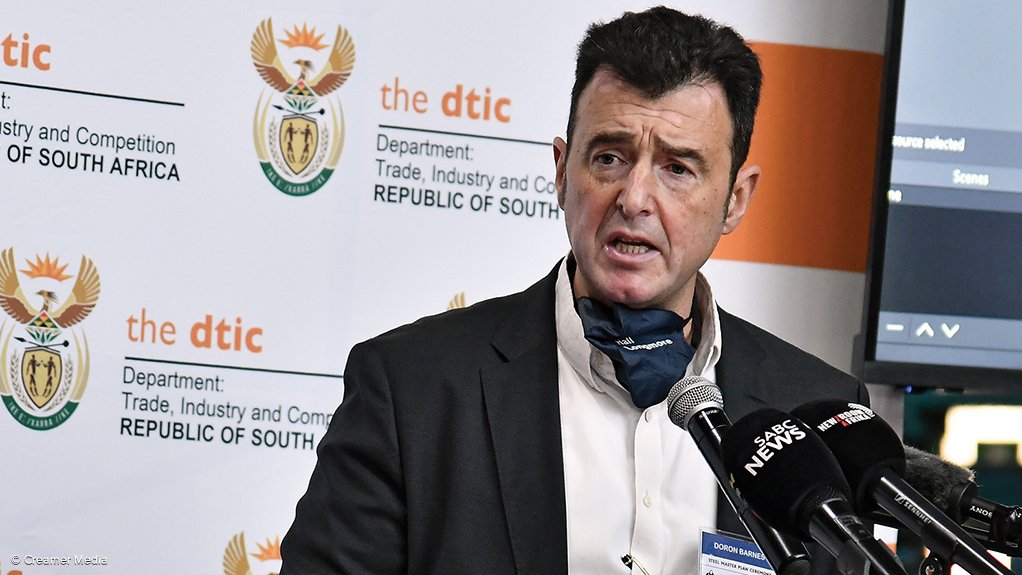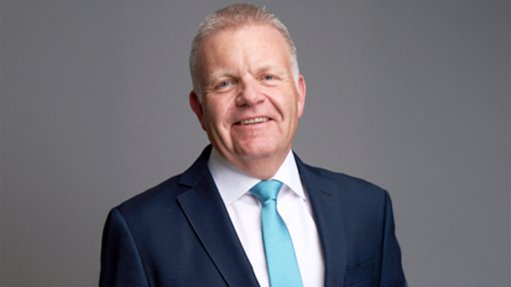Scaw CEO attributes R2bn steel mill investment to scrap certainty created by master plan


Scaw Metals CEO Doron Barnes speaking at the launch of the Steel Master Plan in 2021
Photo by Creamer Media's Donna Slater
Scaw Metals CEO Doron Barnes has attributed the company’s recent decision to invest R2-billion in a new hot-strip steel mill, in Gauteng, directly to the steel master plan, which he insists has the potential to revive both upstream and downstream industries.
The mill, which will incorporate state-of-the-art technology from Danieli, of Italy, will produce 300 000 t/y of thin gauge hot-rolled coil and introduce a domestic flat steel alternative to ArcelorMittal South Africa (AMSA).
Barnes reports that the project is fully funded, with Scaw Metals financing 25% of the project from internal cash resources, with the 75% balance funded using a club loan jointly arranged by Absa and Investec. The two banks, along with the State-owned Industrial Development Corporation (IDC), will contribute equally to the loan.
Civil works on the project have started at Scaw Metal’s Union Junction factory, with commissioning scheduled for December 2023.
In an interview with Engineering News Barnes, who heads the Barnes Group of Companies that acquired some Scaw businesses from the IDC in 2018, acknowledges ongoing criticism of and frustration with the master plan.
However, he believes most of these are based on a misunderstanding of the role of the plan, which he says cannot guarantee immediate progress, for instance, on ensuring that public infrastructure projects proceed – projects that are viewed as key to stimulating demand for steel products.
Instead, he views it as a “platform” through which industry, labour and government can agree on joint actions to address long-standing constraints, or to pursue specific initiatives designed to benefit the industry as a whole.
Barnes acknowledges that each business representative approaches the platform with a corporate agenda but says the workstreams have been set up to support initiatives that have broad-based rather than company-specific benefits and that are aligned with government policy.
Workstreams have been set up to address various sector-wide issues, including:
- supply-side issues, such as those related to the pricing and availability of ferrous scrap;
- exports, with a particular focus on the opportunities that could arise for South African steel products as a result of trade liberalisation in Africa;
- resource mobilisation for enforcement of trade rules and local-content designations, as well as to secure incentives for industry projects;
- transformation and human resource development; and
- demand-side interventions, such as import replacement opportunities and the promotion of buy-local campaigns.
Workstream progress has been patchy since the signing of the master plan in 2021 at Hall Longmore’s factory in Wadeville, which is another Barnes Group company. Nevertheless, Barnes says Scaw’s investment has been made possible partly by the progress made under the aegis of the master plan to limit scrap exports and to implement a 20% export duty on scrap.
“This has enabled the project funders to get comfort that sufficient quantities and correct qualities of ferrous scrap will be available for the plant to produce efficiently,” he tells Engineering News.
While the preferential price system and export tax on scrap remain controversial among some parts of the industry, Barnes argues that it has been instrumental in ensuring that some long steel products, such as wire rod and rebar, are as competitively priced in South Africa today as they are in China.
This competitive position has been enhanced, he acknowledges, by China’s decision to do away with its 13% export rebate.
The investment decision has also been underpinned by changes in the global steel industry that have underlined the value of domestic production. These include the supply and pricing disruptions associated with both Covid and, more recently, Russia’s invasion of Ukraine, and rising freight logistics costs.
Barnes is optimistic that Scaw’s entry into the primary flat steel market in the coming few years could help ensure a similarly competitive outcome as is the case in long products in a subsector currently monopolised by AMSA.
Improving prospects for embattled downstream fabricators remains challenging, however.
The master plan proposes the creation of a Steel Industry Development Fund, financed through a levy on each ton of steel sold domestically, to support the creation of new market opportunities and trade compliance.
Barnes believes there is potential to use the fund to conduct investigations of unfair practices in the trade of certain fabricated products, so as to make the case for tariff protection.
“Making full use of the platform created by the master plan requires active participation,” Barnes stresses.
“This is a fantastic initiative for which Trade, Industry and Competition Minister Ebrahim Patel should be praised, as it shows that government is prioritising the steel industry and is taking it seriously.
“It is now up to industry to take leadership by dedicating time, energy and resources to make it work, rather than sitting back and moaning about all the problems.”
Article Enquiry
Email Article
Save Article
Feedback
To advertise email advertising@creamermedia.co.za or click here
Press Office
Announcements
What's On
Subscribe to improve your user experience...
Option 1 (equivalent of R125 a month):
Receive a weekly copy of Creamer Media's Engineering News & Mining Weekly magazine
(print copy for those in South Africa and e-magazine for those outside of South Africa)
Receive daily email newsletters
Access to full search results
Access archive of magazine back copies
Access to Projects in Progress
Access to ONE Research Report of your choice in PDF format
Option 2 (equivalent of R375 a month):
All benefits from Option 1
PLUS
Access to Creamer Media's Research Channel Africa for ALL Research Reports, in PDF format, on various industrial and mining sectors
including Electricity; Water; Energy Transition; Hydrogen; Roads, Rail and Ports; Coal; Gold; Platinum; Battery Metals; etc.
Already a subscriber?
Forgotten your password?
Receive weekly copy of Creamer Media's Engineering News & Mining Weekly magazine (print copy for those in South Africa and e-magazine for those outside of South Africa)
➕
Recieve daily email newsletters
➕
Access to full search results
➕
Access archive of magazine back copies
➕
Access to Projects in Progress
➕
Access to ONE Research Report of your choice in PDF format
RESEARCH CHANNEL AFRICA
R4500 (equivalent of R375 a month)
SUBSCRIBEAll benefits from Option 1
➕
Access to Creamer Media's Research Channel Africa for ALL Research Reports on various industrial and mining sectors, in PDF format, including on:
Electricity
➕
Water
➕
Energy Transition
➕
Hydrogen
➕
Roads, Rail and Ports
➕
Coal
➕
Gold
➕
Platinum
➕
Battery Metals
➕
etc.
Receive all benefits from Option 1 or Option 2 delivered to numerous people at your company
➕
Multiple User names and Passwords for simultaneous log-ins
➕
Intranet integration access to all in your organisation

















